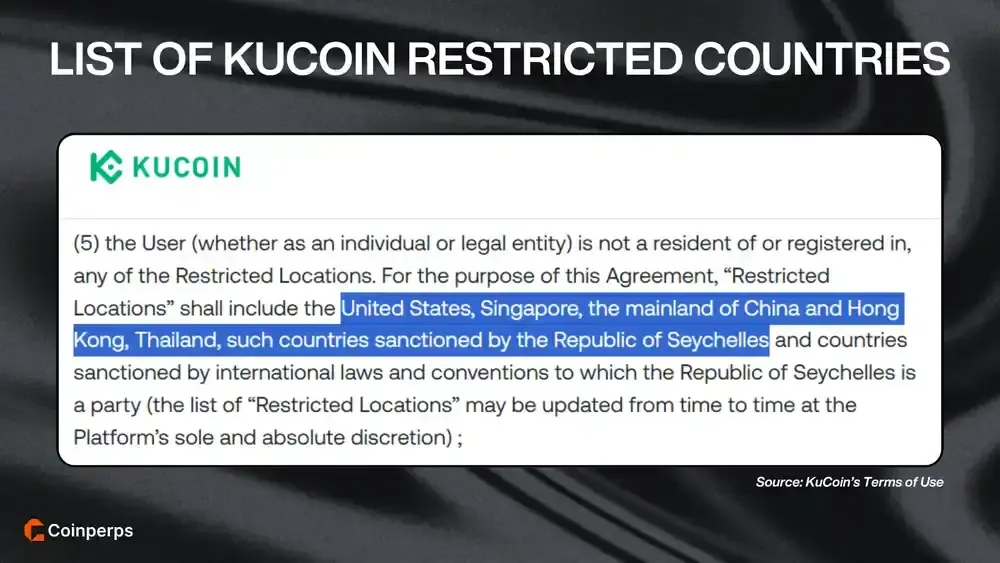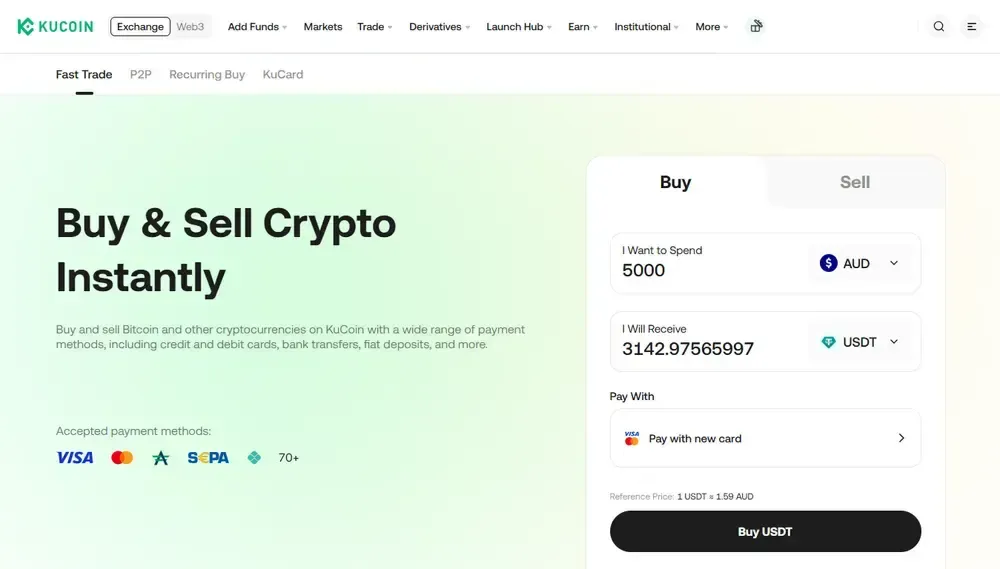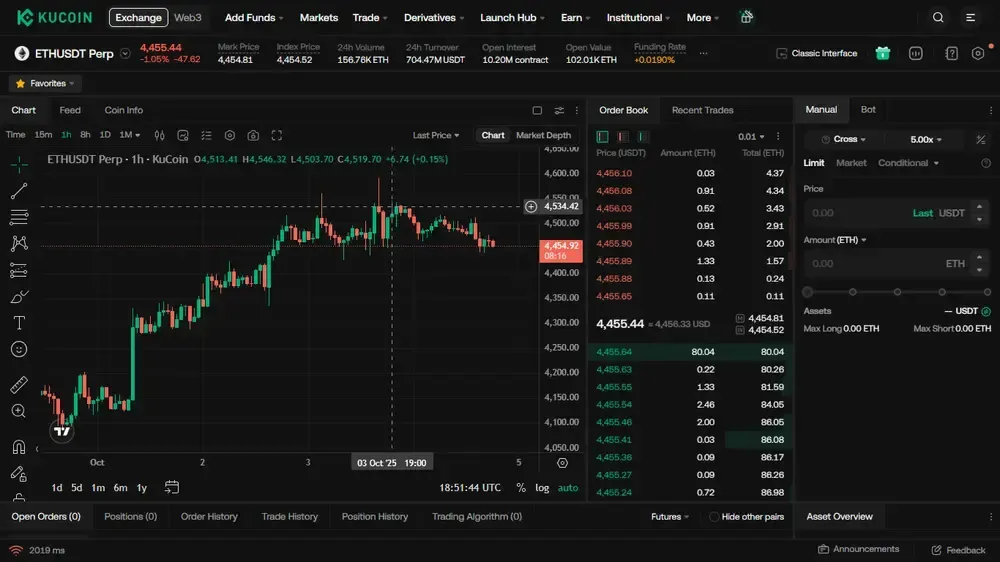- 24H Open Interest$92,423,882,217.490.03%
- 24h Liquidation$71,901,906.650%
- 24h long/short Ratio50.5% / 49.5%
- Fear & Greed Index8
- Bitcoin Price$68,060.10.06%
- Ethereum Price$1,975.330.36%
- Solana Price$85.080.28%
- XRP Price$1.43-0.34%
- 24H Open Interest$92,423,882,217.490.03%
- 24h Liquidation$71,901,906.650%
- 24h long/short Ratio50.5% / 49.5%
- Fear & Greed Index8
- Bitcoin Price$68,060.10.06%
- Ethereum Price$1,975.330.36%
- Solana Price$85.080.28%
- XRP Price$1.43-0.34%
KuCoin Restricted Countries List & Best Alternatives
Read about KuCoin’s 2025 restricted countries list, the regions where it’s unavailable, supported fiat markets, and the best compliant alternatives.
Key Takeaways:
- KuCoin is unavailable in several major markets, including the United States, Singapore, mainland China, Hong Kong, and Thailand, due to regulatory and compliance restrictions.
- The KuCoin exchange serves over 40 million users across 150+ countries, supporting EUR via SEPA, BRL via Pix, and many other global fiat currencies.
- Users in restricted regions can consider licensed alternatives such as Binance and Kraken in Europe, Coinbase and Crypto.com in the U.S., and Bybit and OKX in Asia.

KuCoin
KuCoin is a major global exchange founded in 2017, serving over 30 million users with access to over 1,000 cryptocurrencies and deep spot and futures liquidity.
Features
Fees
Regulation
Overall Rating
KuCoin is a global exchange offering 1,000+ assets, derivatives, and tools like KuCoin Earn, Trading Bots, and KuCoin Pay. It attracts active traders with access to staking yields, and tokenized equities through xStocks.
Still, KuCoin isn’t available everywhere. It’s banned in the U.S., restricted in Singapore, China, Thailand, and parts of Europe, and holds limited licensing outside Seychelles and India, where it’s registered as a VASP.
This guide outlines where KuCoin is restricted, where it supports fiat trading, and the best regulated alternatives in 2025. ⬇️
List of KuCoin Restricted Countries
According to KuCoin’s Terms of Use, the exchange limits access in jurisdictions affected by international sanctions, local financial regulations, or compliance risks under Seychelles law. Restrictions are applied to uphold AML/CTF standards, UN embargoes, and cross-border trading laws.
Below is a grouped overview of the main restricted regions:
- United States and its territories: Fully restricted under OFAC and FinCEN rules, SEC/CFTC securities laws, and Bank Secrecy Act obligations prohibiting unlicensed exchanges from serving U.S. persons.
- Singapore: Blocked in line with the Monetary Authority of Singapore’s Payment Services Act, which requires a local Digital Payment Token license not held by KuCoin.
- Mainland China and Hong Kong SAR: Excluded due to the PRC’s national crypto trading ban and Hong Kong’s licensing regime limiting unregistered platforms.
- Thailand: Restricted under the Thai SEC’s Digital Asset Business Decree amendments, which prohibit offshore exchanges lacking domestic registration.
- North Korea, Iran, Syria, and Cuba: Prohibited under UN and Seychelles-aligned sanctions targeting terrorism financing, money laundering, and illicit trade.
- Belarus and Venezuela: Blocked under Western sanctions addressing political instability, corruption, and state-linked financial misconduct.
- Sudan, South Sudan, and Myanmar: Restricted due to governance sanctions and compliance risks tied to conflict and corruption.
- Crimea, Donetsk, and Luhansk regions (Ukraine/Russia): Prohibited in accordance with U.S. and EU measures covering conflict zones and sanctioned territories.

Countries and Currencies Supported by KuCoin
KuCoin serves over 40 million users across 150+ countries and regions, offering one of the broadest global footprints in the crypto exchange industry. The platform supports fiat deposits, withdrawals, and conversions through multiple payment channels, including SEPA transfers in Europe and Pix in Brazil.
Below is an overview of supported regions and corresponding fiat currency on KuCoin:
- Europe (Eurozone + neighbors): Supports EUR deposits and withdrawals through SEPA and SEPA Instant, covering major markets such as Germany, France, Italy, and Spain.
- South America (Brazil): Offers full BRL functionality via Pix, enabling free deposits and low-fee withdrawals directly through local banks.
- United Kingdom and Ireland: Provides access to GBP and EUR through compatible bank channels and peer-to-peer (P2P) fiat services.
- Asia-Pacific (India, Indonesia, Vietnam): Supports INR, IDR, and VND through regional partners and KuCoin’s Global P2P marketplace.
- Nordics and Northern Europe: Accepts SEK, DKK, and NOK bank deposits, improving fiat access for users in Sweden, Denmark, and Norway.
- Middle East and Africa: Enables AED, SAR, ZAR, GHS, and KES transactions, expanding coverage to users in the UAE, Saudi Arabia, South Africa, Ghana, and Kenya.
- Australia, Canada, and New Zealand: Supports AUD, CAD, and NZD deposits and withdrawals through secure banking integrations.
- Global Markets (USD + Others): Provides fiat conversion options for USD, EUR, JPY, KRW, TRY, and TWD via KuCoin’s Buy Crypto and P2P features.
Additionally, KuCoin applies region-based fiat fees using a mix of fixed and percentage rates. SEPA transfers usually cost 1 EUR or 0.15% of the transaction amount, while Pix in Brazil offers free deposits and 2.6 BRL withdrawals, keeping fiat transactions low-cost and transparent.

Does KuCoin Require Mandatory KYC Verification?
Yes, KuCoin requires mandatory KYC (Know Your Customer) verification for all users. Since August 31, 2023, new users must complete identity verification before accessing any of KuCoin’s products or services, while unverified legacy users are restricted to limited functions such as selling assets or closing open positions.
The KYC process involves submitting personal information, government-issued ID photos, and facial verification. According to KuCoin’s latest guidance, verified users gain access to full platform features, including fiat deposits and withdrawals, and higher withdrawal limits up to 999,999 USDT per day.
Users who fail to complete verification face strict limitations, including the loss of deposit access and reduced withdrawal capabilities. KuCoin enforces KYC to align with global AML/CTF standards, strengthen account security, and prevent identity fraud, money laundering, and terrorist financing on the platform.
Does KuCoin Restrict Derivatives Trading?
KuCoin offers derivatives products such as Futures, Margin Trading, and Leveraged Tokens, but access depends on the user’s jurisdiction and compliance status under the latest Terms of Use.
- Restricted Locations: Article 17(5) prohibits users from the US, Singapore, China, Hong Kong, and Thailand from accessing any KuCoin service, including derivatives, margin, and leveraged products.
- Geographic Controls: Article 49A authorizes KuCoin to apply IP-based restrictions and suspend or terminate trading features where required by regulatory conditions.
- Service Modifications: Article 31 grants KuCoin the right to amend, suspend, or terminate specific services such as futures or margin trading to meet legal and compliance obligations.
- Eligible Regions: KuCoin’s derivatives platform remains available to users in jurisdictions that permit digital asset derivatives trading, subject to KYC verification and applicable risk disclosures.
In practice, KuCoin does not restrict perpetuals trading globally but limits access to compliant jurisdictions. Users from regulated or sanctioned regions cannot trade futures or margin products, and the platform may impose automatic geographic restrictions if IP data indicates access from a restricted zone.

Is KuCoin Banned in the US?
Yes, KuCoin is banned in the United States and does not hold registration with U.S. regulators such as the SEC, CFTC, or FinCEN. Under its Terms of Use (January 24, 2025), KuCoin explicitly lists the United States and its territories as restricted locations where users are prohibited from accessing any services.
This restriction means that U.S. residents cannot legally create accounts, trade, or use KuCoin’s derivatives, margin, or spot services. The ban aligns with OFAC sanctions and U.S. compliance laws governing unregistered digital asset exchanges.
What Licenses Does KuCoin Have?
KuCoin operates globally under its parent entity registered in the Republic of Seychelles, with regional subsidiaries established for compliance in selected jurisdictions. While it remains unlicensed in major Western markets, KuCoin is taking active steps to obtain regulatory approval in the European Union.
Below is an overview of KuCoin’s current and pending regulatory status by region:
- Seychelles: Serves as KuCoin’s global headquarters under a light-touch digital asset framework, enabling international exchange operations and brokerage services.
- European Union: KuCoin EU Exchange GmbH filed for a MiCAR license in Austria (Feb 2025) to offer regulated services across all EU/EEA states.
- United States: Not registered with the SEC, CFTC, or FinCEN; pled guilty in Jan 2025 to unlicensed money transmission and paid $300M in penalties.
- Canada: Banned in Ontario (2022) and fined C$19.55M (2025) by FINTRAC for AML violations and failure to report large crypto transactions.
- Netherlands: Declared non-compliant by the Dutch Central Bank (2022) for operating without AML registration or a recognized money service license.
- United Kingdom: Added to the FCA’s Unauthorized Firms List (Oct 2023), blocking KuCoin from legally promoting or offering crypto trading in the UK.
- India: Approved as a Virtual Asset Service Provider (VASP) in May 2024 after paying a ₹3.5M fine, granting it legal market access.
Best Alternatives if KuCoin is Unavailable in Your Country
If KuCoin is not accessible in your region due to licensing or regulatory restrictions, there are several reputable and fully compliant alternatives available. Each of the following platforms offers strong regional coverage, regulatory licensing, and advanced security frameworks.
The table below compares the leading exchanges that traders often turn to as alternatives to KuCoin:
KuCoin Alternatives in Europe
Binance is the closest alternative to KuCoin for European traders seeking wide asset coverage and low fees. It operates under multiple EU registrations, including France’s AMF and Italy’s OAM, supporting SEPA transfers, EUR trading pairs, and over 350 listed cryptocurrencies.
Kraken appeals to KuCoin users who value strong regulatory protection and institutional-grade compliance. It holds VASP licenses across the EU and UK, supports futures and margin trading up to 5x leverage, and provides transparent Proof of Reserves audits, offering a safer, more regulated environment than KuCoin.
KuCoin Alternatives in the United States
Coinbase stands as the most compliant exchange for U.S. traders, holding Money Transmitter Licenses in 46 states and a BitLicense in New York. It offers spot and derivatives markets regulated by the CFTC and stores more than 95% of user funds in insured cold storage.
Crypto.com is another accessible alternative of Kucoin for Americans, offering 350+ coins, a crypto Visa card, and competitive derivatives trading. The platform is registered as an MSB in the U.S. and regularly publishes third-party proof-of-reserves audits to verify full asset backing.
KuCoin Alternatives in Asia
Bybit is ideal for Asian traders seeking deep derivatives liquidity and modern trading tools that KuCoin doesn't have. Headquartered in Dubai under VARA oversight, Bybit provides perpetual futures up to 100x leverage and supports localized markets across 160 countries.
OKX offers one of the region’s most complete trading ecosystems, covering spot, futures, and Web3 products under MAS (Singapore) and VARA (Dubai) supervision. It supports over 300 assets, maintains verifiable 1:1 reserves using zk-STARK cryptography, and consistently ranks among the top global exchanges by volume.
Bottom Line
KuCoin’s global reach continues to grow despite regulatory headwinds, reflecting the crypto industry’s progress toward compliance expansion. As jurisdictions tighten oversight, the exchange’s push for licenses like the EU’s MiCAR filing signals a maturing phase where accessibility and regulation must finally coexist.
Frequently asked questions
Yes. KuCoin holds SOC 2 Type II and ISO 27001:2022 certifications and completed an independent Proof of Reserves audit by Hacken, confirming 1:1 asset backing and strong internal controls.
No. Since August 31, 2023, identity verification (KYC) is mandatory for all new accounts, and unverified users can only close positions or withdraw funds.
Yes. KuCoin integrates with BitGo’s Go Network for institutional-grade custody and provides tailored trading and liquidity services through KuCoin Institutional.
Yes. KuCoin has filed for a MiCAR license in Austria to operate legally across the EU and EEA, signaling a broader move toward regulated, region-specific operations.
.avif)